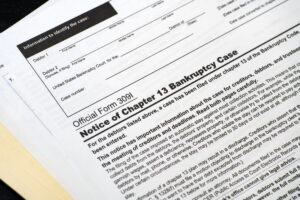Ask any bankruptcy attorney, and they’ll you that one of the top reasons people come to them is because they’ve recently gone through a divorce. Suddenly, their finances are in disarray. They turned to credit cards to help them make it through the process, paying for things like moving and living expenses and even fees for their divorce attorney. On top of this, they may have to pay child support and spousal maintenance (alimony). In some cases, they may be responsible for their ex-spouse’s debts and divorce attorney fees. The financial burden becomes too much.
When consulting with someone who has come to me after a divorce, it’s important to find out just what the terms of the divorce and separation agreement provide for. Chapter 7 bankruptcy is limited in the types of divorce related debts it will get rid of. In either Chapter 7 or Chapter 13 bankruptcy, you cannot eliminate an obligation to pay child support or spousal maintenance.
But only Chapter 13 can help when it comes to other divorce related debts, like your ex’s credit cards (or cards that were in both of your names) and his or her attorney’s fees. If you’re responsible for these kinds of debts and file Chapter 7 bankruptcy, the credit card companies and her attorney can’t sue you to collect what you owe, but your ex-spouse can ask the divorce court to find you in contempt for not paying those debts. You’ll end up paying them anyway. Chapter 13 eliminates those kinds of debts and also prevent your ex-spouse from coming after you in divorce court.
Whether or Chapter 13 makes sense in this situation depends on some other factors as well. For instance, if your ex-spouse has also filed bankruptcy, he or she is no longer liable for those debts so there is no reason to resort to the divorce court to ask you to pay them. Also, if those debts are minimal, you may decide to go ahead and pay them after you file Chapter 7 bankruptcy after you compare how much that would cost with how much you would pay in a Chapter 13 bankruptcy. (Chapter 13 bankruptcy requires you to pay all or some of your debts. It depends entirely on what your income and regular expenses are.)
If your divorce has caused you to struggle to make ends meet, we hope you’ll come in for a free, no-obligation consultation with an experienced Colorado bankruptcy attorney to learn how bankruptcy may help. You can schedule an appointment by calling 303.331.3403 or by using our online scheduling system.



